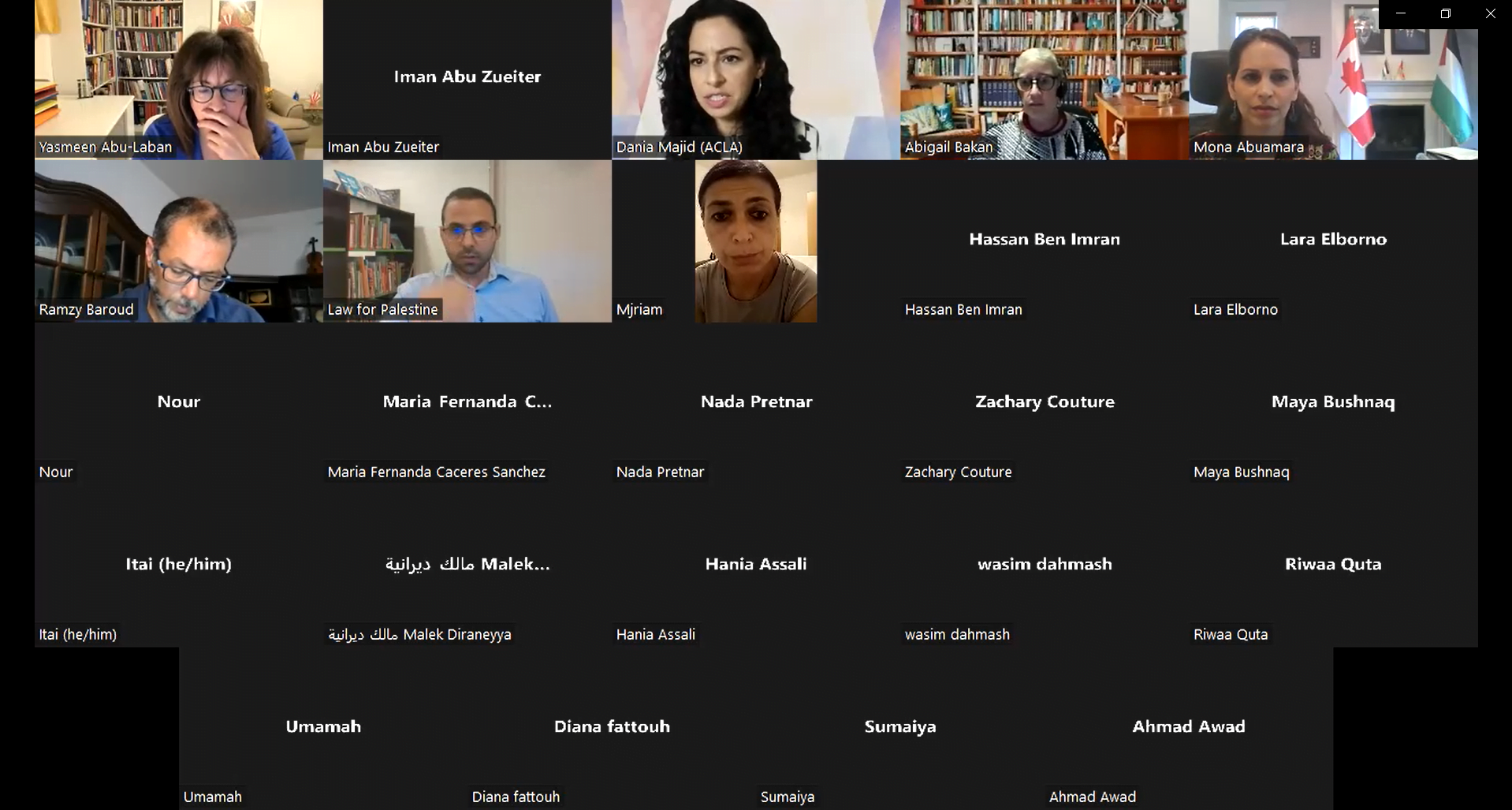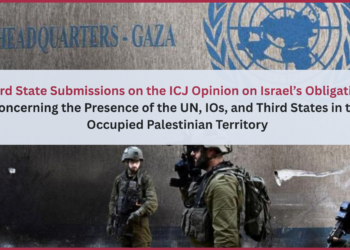In a High-Profile Webinar, Jurists for Palestine Forum is Discussing the Anti-Palestinian Racism Concept, its Motives, Manifestations and Solutions
United Kingdom_18 August 2022: Law for Palestine in partnership with the Arab Alliance for Rights and Development (ARDD) has organized within the monthly webinars of “Jurists for Palestine Forum”, a webinar titled “Anti-Palestinian Racism: Motives, Manifestations and Solutions”. The webinar sheds light on the importance of the concept Anti-Palestinian Racism as a regular term to capture the diverse forms of racism and discrimination against Palestinians and those advocating for Palestinian rights.
The webinar was held on Thursday 18 August 2022 via Zoom and hosted Abigail B. Bakan, Professor at the Department of Social Justice Education (SJE) at OISE, and cross-appointment Anne Tanenbaum Centre for Jewish Studies, University of Toronto, Dania Majid: Co-founder and president of the Arab Canadian Lawyers Association, and Ramzy Baroud: US-Palestinian journalist, internationally syndicated columnist, and Editor of Palestine Chronicle (1999-Present).
This is besides 40 discussants of jurists, academics and researchers, including Professor of Political Science at University of Alberta (Canada) who has several Publications on the Anti-Palestinian Racism, Yasmeen Abu Laban, Ambassador to the Palestinian General Delegation to Canada, Mona Abu Amara, and the Palestinian Researcher Dr. Salman Abu Sitta, among other experts and members of the Jurists for Palestine Forum.
The webinar was moderated by Mjriam Abu Samra, Senior research officer at ARDD, and was also followed by more than 1150 members of the Jurists for Palestine Forum from around the world.
Dania Maijd: Anti-Palestinian Racism is more about targeting those who dare to speak up for Palestinians and their systems
In her intervention, Dania Maijd tackled the process of putting down the description of Anti-Palestinian Racism stressing that “it was decided to describe it as a description rather than a definition in order to avoid it being perceived as something that was rigid and final … and to not exclude anyone’s experiences which will obviously vary by contexts and groups”. One purpose of this description was to provide an advocacy tool for communities in diaspora to push back against the efforts of being silenced.
According to Diana, current description is more about hatred against Palestinians and their allies in diaspora and does not include the oppression practiced against Palestinians inside Palestine. Diana hopes that this description would “create a resource that lets Palestinians know that their experiences are seen, and they are real, that this is not in their head. It is a collective and shared experience. And that this experience has a name” which shall eventually help Palestinians and their allies to speak more confidently about the racism they face and feel more empowered and supported.
Abigail B. Bakan: Anti-Palestinian Racism is coded under the false charges of anti-semitism
On her part, Professor Abigail B. Bakan analyzed a different manifestation for the anti-Palestinian racism. Bakan described that all types of racisms in the current era are often coded, and this coding takes various forms, and that the false charges of antisemitism is one way by which Anti-Palestinian Racism is coded. She argued that the misuse of antisemitism, as of preventing any criticism of the state of Israel, rendered Palestinians and their allies being silenced from any talks about Palestine.
Professor Bakan described how the concept of anti-Palestinian racism and its report provides an important step for identifying and fighting against the intentional and advocated erasure of Palestinian lives, experience, history, rights, contributions and realities from the global politics and the production of Knowledge. A manifestation of this, according to Professor Bakan, is the deep absence of Palestine from post-secondary education that purposely erases any mention of Palestine in any of the curricula even that of political science which is supposed to study the politics of the world and even when the case of Palestine perfectly fits.
Ramzy Baroud: Palestinians living in Palestine and those living outside of it all have to confront the same kinds of experiences
Ramzy Baroud described how racism is connected with dehumanization which was a mentality adopted by the Zionist movement to erase Palestinians and Palestinian history. He explained that “Western media, academia, intelligence, etc. are in many ways a reflection of that existing racist mentality that governs Israel’s relationship with the Palestinians”.
As a result of this embracement of the Israeli perspective, Palestinians are not met with a neutral environment in which they can present and defend their point of view as a part of a cultural dialogue and international debate. “No debate exists at all because no one is given the benefit of the doubt, instead are under attack, accused, and marginalized” stated Baroud.
Baroud elaborated that recent polls coming out of Israel illustrate the incredibly racist view that Israelis have of Palestinians in Palestine, Israel, and the diaspora. Israeli political thinking and elections are all based on this foundation and cornerstone of APR. Thus, providing a definition for APR is a pivotal move from merely highlighting the kind of racism, prejudice, marginalization, and dehumanization to a whole new sphere of having a Palestinian definition that is consistent with common sense, international law, humanitarian law, and civil laws of any given society. “It shows that we too are capable of holding racists accountable” said Baroud.
Yasmeen Abu Laban: APR framework brings together the experiences of Palestinians across geographic spaces
On her side, the commentator Yasmeen Abu Laban stated that while thinking about how to combat racism, it is becoming ever more apparent that there is a need to think about specific forms of racism. Therefore, the framework provided by the ACLA and by this discussion are timely, constructive, and hugely contributory. She added that the APR framework has elements that potentially bring together the experiences of Palestinians across geographic spaces of the Green Line, occupation, and diaspora. This unifying power is important because about three quarters of Palestinians cannot visit their homeland and those who are there live in fragmentation. Abu Laban stated.
Abu Laban ended her intervention by raising several concerns including the starting point from where the APR as a concept originated and the period it covers as well as the APR’s position in relation to other concepts of racism and discrimination. These questions and others have been discussed by the panelists and attendees in a rich and thorough manner.
This webinar comes within the monthly activities of the Jurists for Palestine Forum, affiliated to the Law for Palestine Organization. The Forum is holding online monthly webinars gathering international experts and researchers, students, jurists and people interested in Palestine from different countries of the world to discuss topics and developments related to international law and Palestine, in addition to effectively networking between jurists interested in Palestine from all over the world.
* To read a full summary of this webinar, kindly click here
** To attend the next monthly webinars of Jurists for Palestine Forum, you can register via the following link “here“





